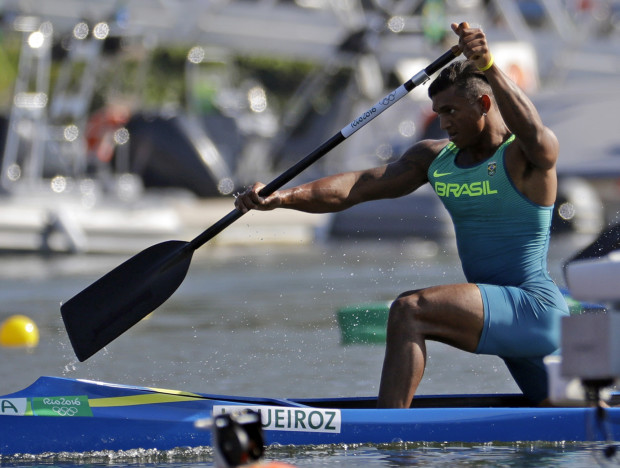Meet ‘Missing Kidney,’ Brazil’s hope for Olympic canoe gold

Brazil’s Isaquias Queiroz Dos Santos paddles during the men’s canoe single 1000m heat during the 2016 Summer Olympics in Rio de Janeiro, Brazil, Monday, Aug. 15, 2016. (AP Photo/Andre Penner)
RIO DE JANEIRO — He was scalded at 3, kidnapped two years later, and lost a kidney when he fell from a tree at 10. To say Isaquias Queiroz got a rough start to his life would be an understatement.
At the Rio de Janeiro Games, the 22-year-old Brazilian is aiming to become the world’s fastest canoeist and the first from the country to win Olympic gold in the sport. He’s got three chances, starting with the 1,000-meter canoe singles final on Tuesday.
“Winning the gold medal would mean the world to me,” Queiroz told The Associated Press after winning his qualifying heat Monday. “It is worth so much and carries so much meaning, not only for me, but for the nation and for any Brazilian.”
There is no visible trace of the hardship he faced while growing up; the scar from his kidney operation is hidden by his green unisuit. Paddling on the lagoon in Rio, he is a confident young man with a gemstone gleaming in his left ear, tattoos covering his right shoulder.
But Queiroz is still young and entering his first Olympics with the weight of a nation on his broad shoulders. Brazil counts on him to follow up on his three world titles with at least one Olympic gold medal. He’s also competing in the 200-meter sprint and the 1,000-meter doubles.
The story of this unlikely Olympian begins in Ubaitaba, a small town in Brazil’s impoverished northeast, where Queiroz grew up with his mother and nine siblings, four of them adopted. His father died when he was 5.
The town’s name stems from the indigenous word for canoe, historically the main mode of transportation on the Rio de Contas river. But Queiroz was more interested in soccer until he tried competitive canoeing when he was 11 as part of a government-funded social project, said Figueroa Conceicao, his childhood coach.
“From his first contact with the water, I realized that he was good, that he had something special,” Conceicao said.
He couldn’t figure out why everyone called the boy “Sem Rim,” which means missing kidney in Portuguese.
“So he showed me the scar and told me the story of when he went to see a snake which was up in a tree,” Conceicao said. “There was a rock and he fell on it and he had to go to the hospital. They took out his kidney.”
It wasn’t the only time the boy was in grave danger. As a toddler he required emergency care after being scalded when a pot of hot water fell over him. When he was around 5 he was kidnapped but returned to his mother unharmed.
Conceicao said Queiroz was a restless boy who didn’t always do as he was told. Like the time just before a tryout for a national competition when Queiroz ignored his coach’s ban on swimming in the polluted river where they were training. Conceicao decided to punish the boy by making him compete in a higher age bracket.
“He said, ‘No problem.’ And the next Saturday, at the tryouts, he came in second,” Conceicao said.
From there Queiroz’s career took off. By 2011, he was a junior world champion and two years later he won the first of three world titles.
Coached by Spaniard Jesus Morlan, he’s now competing on the Rodrigo de Freitas Lagoon in Rio before a roaring crowd, including his mother and several of his friends.
“I feel at home because I have lived here for two years. I already know the lagoon well,” Queiroz said after his heat. “When the wind comes here it is very complicated. But I’m very happy for my first victory at home. I hope to do better in the final.”
Queiroz resists talking about his modest and accident-prone background. In several interviews with Brazilian media before the Olympics, he insisted his childhood was a happy one.
The hardship he has faced, Queiroz told the AP, lies in the countless hours of grueling training it takes to become a top-level Olympic canoeist.
“I think the journey of an athlete comes with many difficulties,” he said. “It’s not smooth, not easy work. You have to kill yourself daily to get to the competition and win.”














